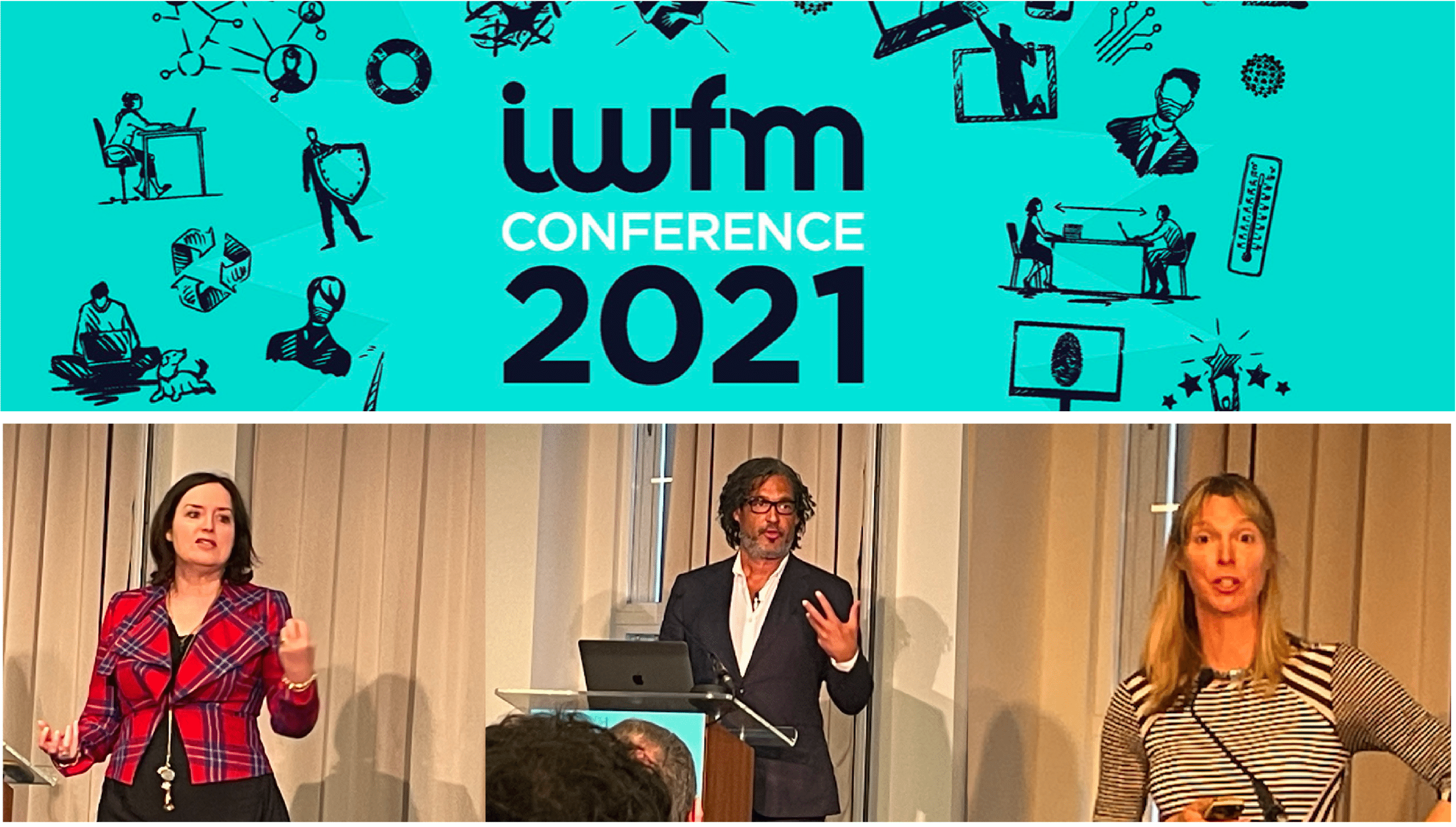For the majority of the 100-strong physical audience, it was the first time they’d been at a conference since March 2020 but this year’s IWFM conference more than lived up to its Emerging Stronger theme.
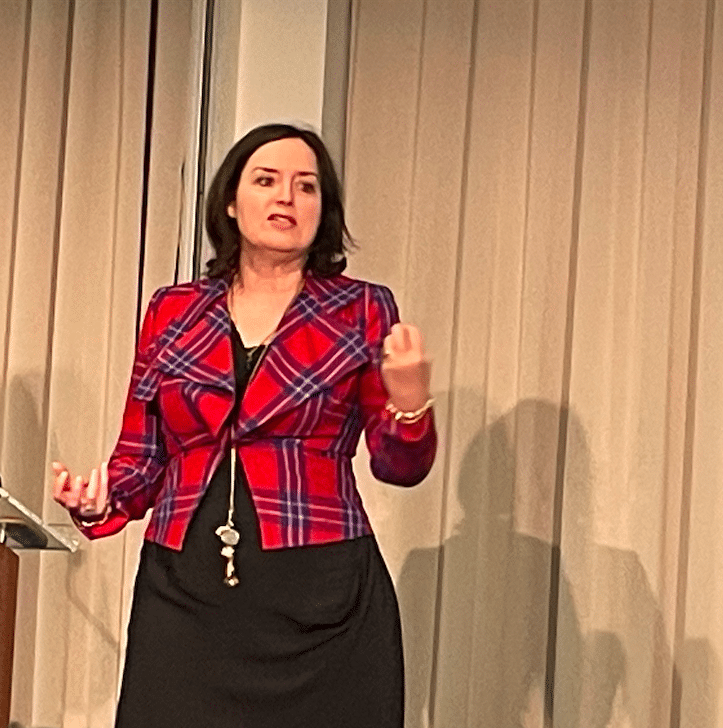 The hybrid event, which was themed around the mega-trends of climate action, technology and the future of work, was book-ended with two hard-hitting keynote speakers focused on diversity. Comedian Deborah Frances-White opened arguing that diversity and inclusion “is too often shorthand for women.” Organisations hire a woman and feel they’ve done their bit. But she argued that there’s a third part to D&I – belonging. “If you’re invited to your partner’s school reunion, you’re included, but you don’t belong. There are people who work in organisations who are included but don’t feel they belong.” She called on people who do belong to make others feel the same by giving (careful) compliments, asking how they feel about working in the organisation and bringing their expertise to the fore in meetings. Everything has been disrupted because of the pandemic. It’s an opportunity to make people feel they belong, she concluded.
The hybrid event, which was themed around the mega-trends of climate action, technology and the future of work, was book-ended with two hard-hitting keynote speakers focused on diversity. Comedian Deborah Frances-White opened arguing that diversity and inclusion “is too often shorthand for women.” Organisations hire a woman and feel they’ve done their bit. But she argued that there’s a third part to D&I – belonging. “If you’re invited to your partner’s school reunion, you’re included, but you don’t belong. There are people who work in organisations who are included but don’t feel they belong.” She called on people who do belong to make others feel the same by giving (careful) compliments, asking how they feel about working in the organisation and bringing their expertise to the fore in meetings. Everything has been disrupted because of the pandemic. It’s an opportunity to make people feel they belong, she concluded.
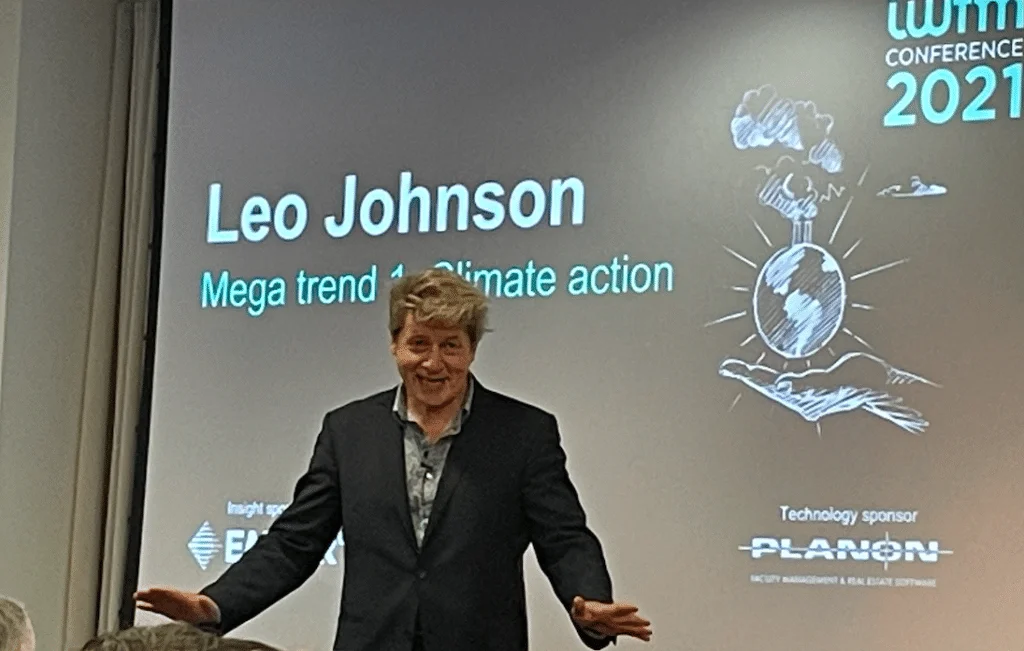 The built environment is a lab for innovation in climate action said Leo Johnson, head of disruption practice at PWC and the Prime Minister’s younger brother. He pointed to climatetech being the hottest investment at the moment as evidence that there is huge potential. Referencing IOT solutions, the reduction in the cost of creation of green energy, advances in electric cars and the “second wave” of sustainable development with solar glass and battery recycling, he said there were many reasons to be optimistic.
The built environment is a lab for innovation in climate action said Leo Johnson, head of disruption practice at PWC and the Prime Minister’s younger brother. He pointed to climatetech being the hottest investment at the moment as evidence that there is huge potential. Referencing IOT solutions, the reduction in the cost of creation of green energy, advances in electric cars and the “second wave” of sustainable development with solar glass and battery recycling, he said there were many reasons to be optimistic.
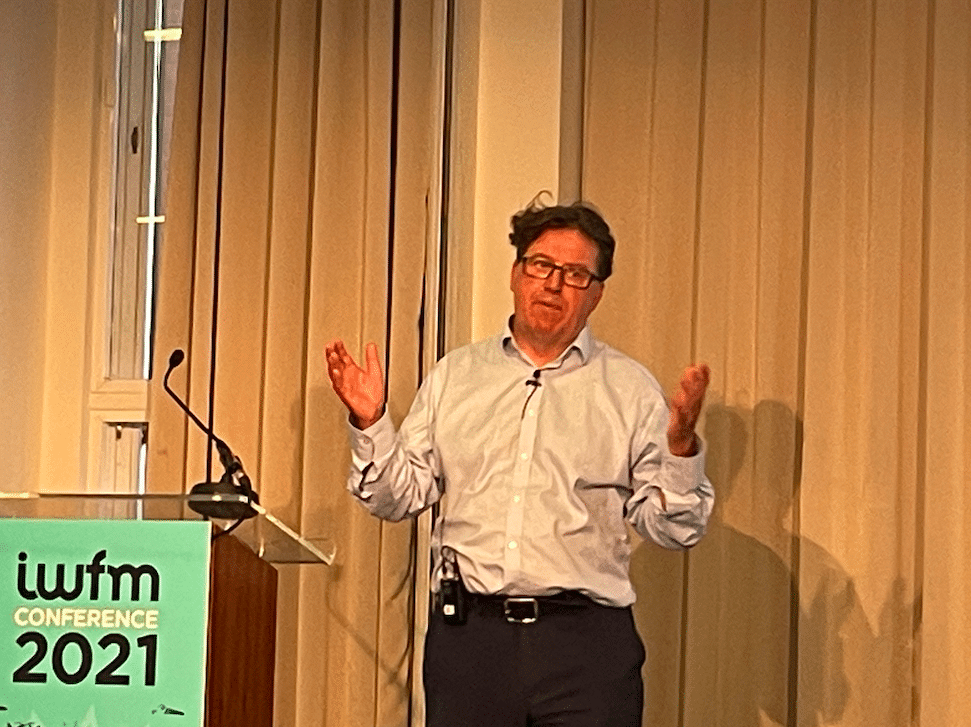 Guy Battle from Social Value Portal took a different look at climate action, focusing on FM ‘s fundamental role in unlocking social value in communities. When it comes to real estate’s lifetime value, FM is the “jam in the middle’ with influence over the construction and operation of a building but also the behaviour of occupiers, he said. With the public sector now placing a 10% weighting on social value in tenders, the FM supplier community needs to embrace social value urgently. “Social value will become as important as environmental concerns,” he said. But Battle went on to warn that organisations needed to understand the needs in their local communities rather than second guessing them.
Guy Battle from Social Value Portal took a different look at climate action, focusing on FM ‘s fundamental role in unlocking social value in communities. When it comes to real estate’s lifetime value, FM is the “jam in the middle’ with influence over the construction and operation of a building but also the behaviour of occupiers, he said. With the public sector now placing a 10% weighting on social value in tenders, the FM supplier community needs to embrace social value urgently. “Social value will become as important as environmental concerns,” he said. But Battle went on to warn that organisations needed to understand the needs in their local communities rather than second guessing them.
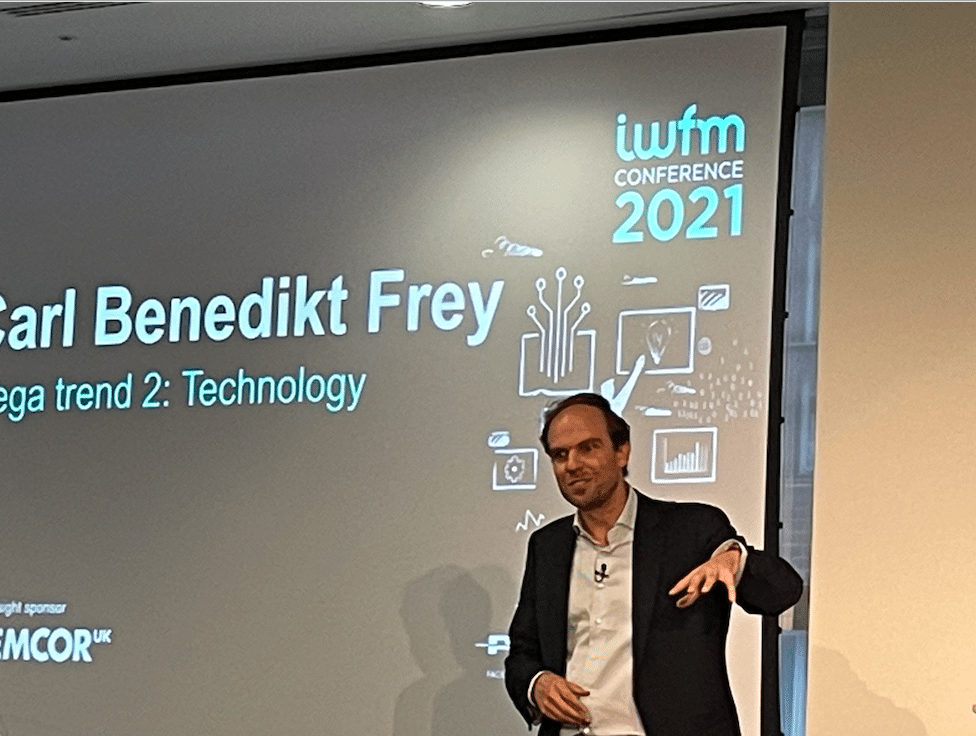 In a brilliant session reminiscent of a university lecture, economic historian Carl Benedikt Frey compared the first industrial revolution with the fourth which we now face with seismic advances in technology. While predicting more automation in many areas of life, he said creativity, social intelligence, perception and manipulation are all bottlenecks to further automation. “We cannot currently get a computer to distinguish between a pot which needs cleaning and one that houses a plant.” So cleaning roles are safe for now. But Benedikt Frey saw a divide with both automation and remote working. “Low-skilled and low-paid jobs are both susceptible to automation and less likely to be able to be done remotely.” This is creating a two-tier workforce, he said. Despite the ability to work remotely, he is very much in favour of mandated office time to improve innovation. But spaces will have to be designed differently with more opportunities to collide and have spontaneous interactions.
In a brilliant session reminiscent of a university lecture, economic historian Carl Benedikt Frey compared the first industrial revolution with the fourth which we now face with seismic advances in technology. While predicting more automation in many areas of life, he said creativity, social intelligence, perception and manipulation are all bottlenecks to further automation. “We cannot currently get a computer to distinguish between a pot which needs cleaning and one that houses a plant.” So cleaning roles are safe for now. But Benedikt Frey saw a divide with both automation and remote working. “Low-skilled and low-paid jobs are both susceptible to automation and less likely to be able to be done remotely.” This is creating a two-tier workforce, he said. Despite the ability to work remotely, he is very much in favour of mandated office time to improve innovation. But spaces will have to be designed differently with more opportunities to collide and have spontaneous interactions.
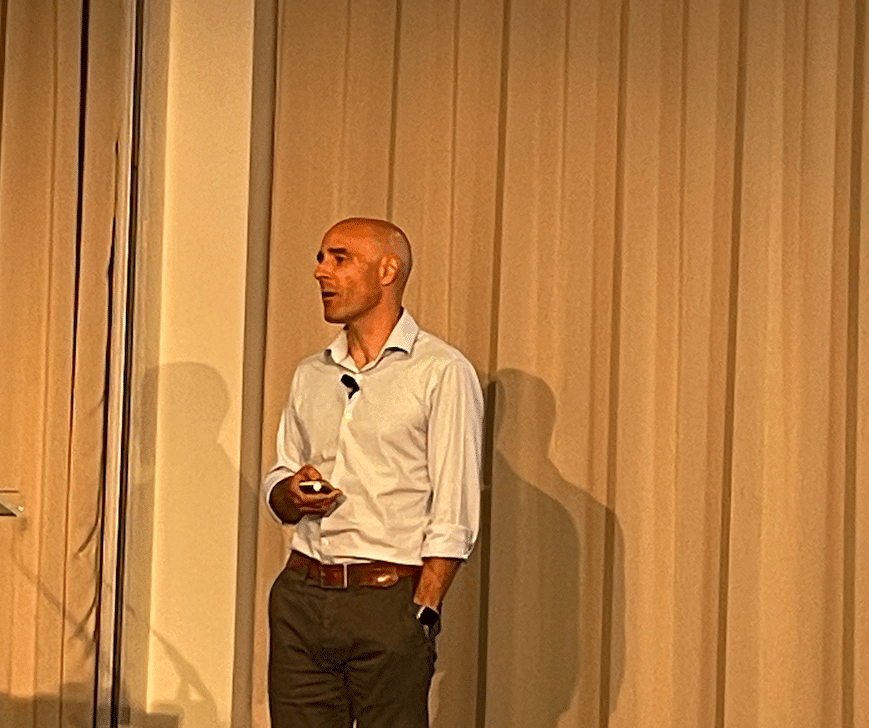 Ian Ellison and James Pinder from 3edges then took the debate into the FM arena, arguing that FM is comparatively immature when it comes to the value of data and implementing digital strategies to harness the power of data. That leads to frustration and can negatively affect the image of FM. “If we want to answer the big workplace questions, we need access to lots of data across the organisation,” said Ellison. “Do we have it, or are we more focused on FM data?” There’s a risk of taking the last 18 months of executive attention on the workplace for granted, he said. We mustn’t sleepwalk past the opportunity.
Ian Ellison and James Pinder from 3edges then took the debate into the FM arena, arguing that FM is comparatively immature when it comes to the value of data and implementing digital strategies to harness the power of data. That leads to frustration and can negatively affect the image of FM. “If we want to answer the big workplace questions, we need access to lots of data across the organisation,” said Ellison. “Do we have it, or are we more focused on FM data?” There’s a risk of taking the last 18 months of executive attention on the workplace for granted, he said. We mustn’t sleepwalk past the opportunity.
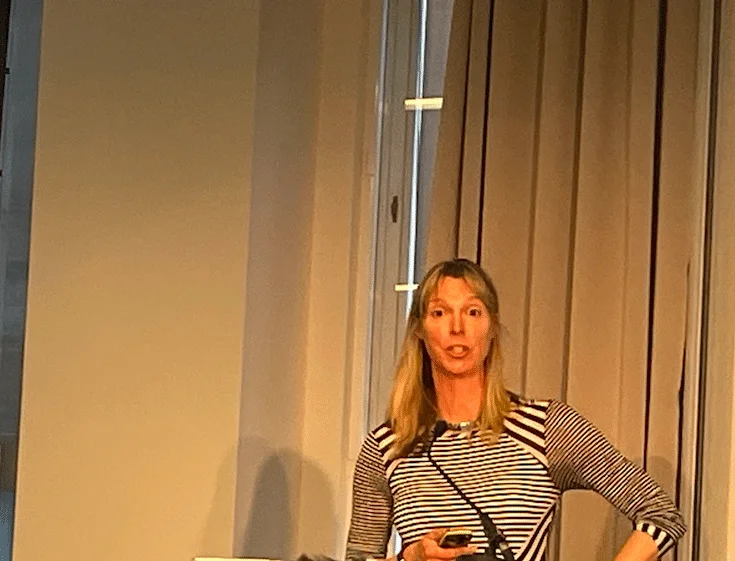 Journalist Camilla Cavendish was the perfect speaker for the after-lunch slot with a wide-ranging presentation on the future of work. Work will become more human, she said, referencing all the Zoom mistakes people had made over the past 18 months. “We need to hold on to that as it might pave the way to better work.” While bread and butter business could be done remotely, the really exciting stuff happens face to face, she said. When thinking about hybrid work, organisations need to focus on four areas:
Journalist Camilla Cavendish was the perfect speaker for the after-lunch slot with a wide-ranging presentation on the future of work. Work will become more human, she said, referencing all the Zoom mistakes people had made over the past 18 months. “We need to hold on to that as it might pave the way to better work.” While bread and butter business could be done remotely, the really exciting stuff happens face to face, she said. When thinking about hybrid work, organisations need to focus on four areas:
- Time: when people will work in the office to maximise both their interaction but also space utilisation
- Place: how organisations can entice people back by using the fear of missing out and making the workplace full of people you want to meet
- Mental space: ensuring that people maintain a barrier between home and work – a commute can be a good way of helping this
- Productivity: co-ordination is possible online but collaboration is more challenging
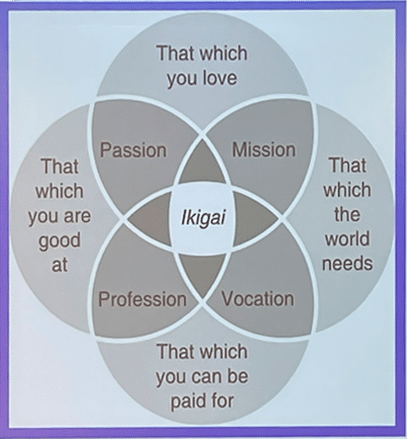 Cavendish also focused extensively on hierarchies and the generational divide arguing that we need to rethink how we think about careers (older people shouldn’t necessarily be seen as more senior and the higher earners). “Careers aren’t ladders, they’re lattices,” she argued describing the Japanese concept of Ikigai, or purpose, where people bring together their passion, mission, profession and vocation to create a portfolio of careers and interests.
Cavendish also focused extensively on hierarchies and the generational divide arguing that we need to rethink how we think about careers (older people shouldn’t necessarily be seen as more senior and the higher earners). “Careers aren’t ladders, they’re lattices,” she argued describing the Japanese concept of Ikigai, or purpose, where people bring together their passion, mission, profession and vocation to create a portfolio of careers and interests.
Ian Baker from EMCOR UK followed up by arguing that we need to think beyond (dedicated) buildings. He called not for an evolution in workplace but a revolution. “Revolution has purpose, evolution is random. The genie is out of the bottle.” We need to restructure workplaces and organisations so they are better for the planet, for people’s wellbeing, and the wider communities, he said, rather than looking at the workplace as service to real estate.
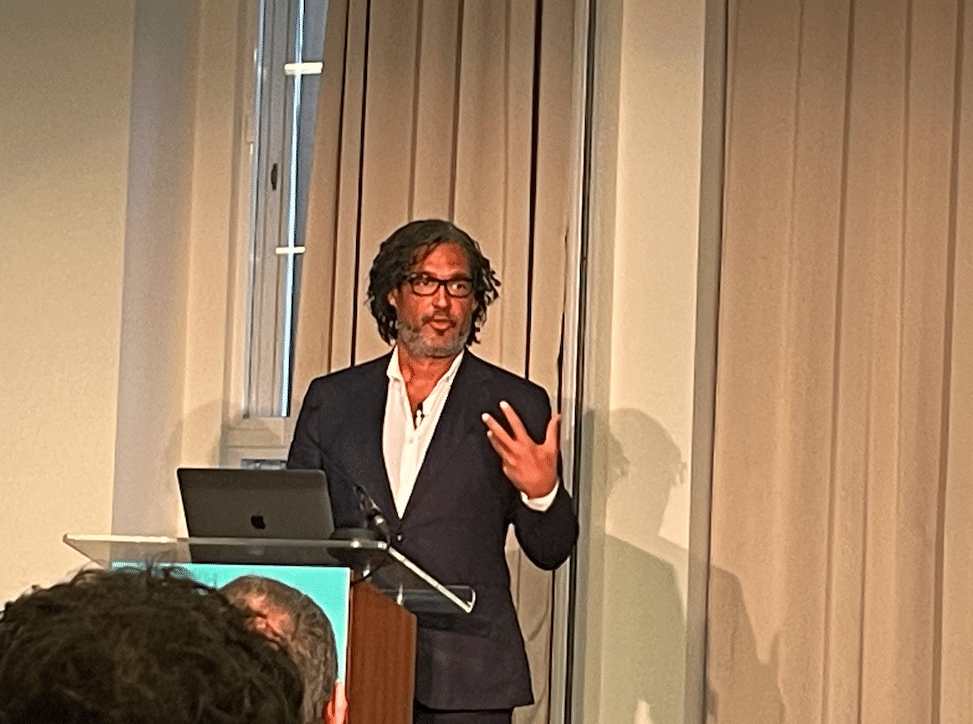 The conference ended where it began with an impassioned focus on diversity. Talking to a largely white audience David Olusoga OBE argued that silence or inaction against racism is not neutrality, it’s complicity. A lifelong insomniac, he talked about arriving to work in the early hours of the morning and witnessing the two-tier workforce who never usually meet. The incredibly diverse facilities workers had largely disappeared by 8am when the mainly white office workers arrived. Well-meaning people normalise this lack of diversity, he said. “Something as random as skin colour impacts our life chances.” Olusoga looked back at the significant progress made over the last 18 months with the Black Lives Matter movement and urged the audience to ask themselves some difficult questions. “The reflection we need to do, the changes we need to make, is the small entry price to the society the majority of people say they want.”
The conference ended where it began with an impassioned focus on diversity. Talking to a largely white audience David Olusoga OBE argued that silence or inaction against racism is not neutrality, it’s complicity. A lifelong insomniac, he talked about arriving to work in the early hours of the morning and witnessing the two-tier workforce who never usually meet. The incredibly diverse facilities workers had largely disappeared by 8am when the mainly white office workers arrived. Well-meaning people normalise this lack of diversity, he said. “Something as random as skin colour impacts our life chances.” Olusoga looked back at the significant progress made over the last 18 months with the Black Lives Matter movement and urged the audience to ask themselves some difficult questions. “The reflection we need to do, the changes we need to make, is the small entry price to the society the majority of people say they want.”
The conference the IWFM had planned for March 2020 had Navigating Turbulent Times as a theme which ended up being more than apt for the following 18 months. Let’s hope the 2021 conference theme Emerging Stronger is as prescient.

